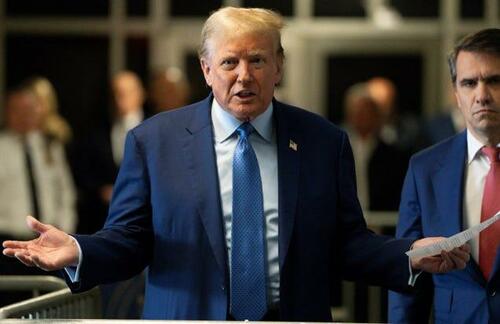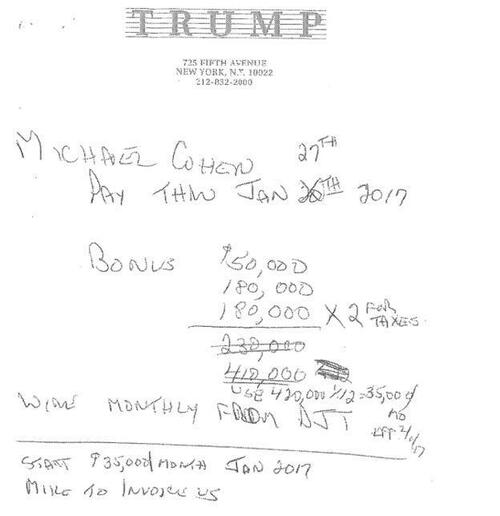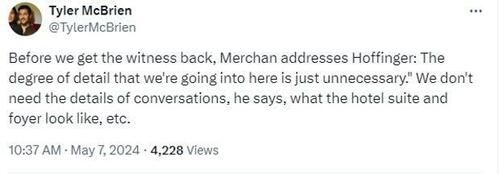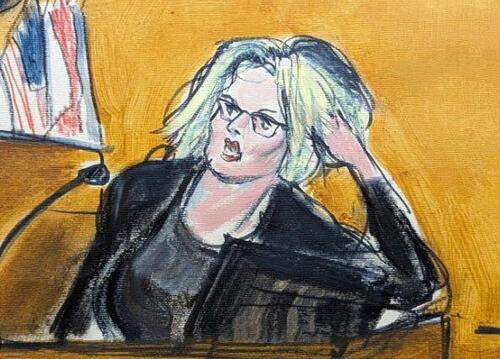
Authored by Techno Fog via The Reactionary,
This week of The State of New York v. Donald Trump began with Judge Juan Merchan’s threat to imprison Trump for his social media posts. Again, at the insistence of the State, Judge Merchan leveled monetary penalties against Trump for the remarks he has made outside the Court.
Voicing his frustration with Trump, Judge Merchan reminded the Republican candidate for president that jailtime is a very real option:
“Your continued violations of this Court’s lawful Order threaten to interfere with the administration of justice in constant attacks which constitute a direct attack on the rule of law. I cannot allow that to continue.
So, as much as I do not want to impose a jail sanction, and I have done everything I can to avoid doing so, I want you to understand that I will, if necessary and appropriate.”
This third week of evidence in the Trump trial started with the State continuing to lay the foundation for the Stormy Daniels non-disclosure agreement (NDA), Michael Cohen’s involvement in that deal, and how Cohen was compensated after that deal took place.
Witness: Jeffrey McConney
It began with the testimony of Jeffrey McConney, the former corporate controller of the Trump Organization. He was a longtime employee who started with the company in 1987. He has since retired.
After some description of the Trump Organization’s corporate structure, McConney detailed the payments to Michael Cohen that are alleged to be related to the Stormy Daniels payoff. McConney oversaw the company’s accounting department, which included accounts payable and the company’s general ledger, and he explained the process used by the company to issue checks.
His former boss, Allen Weisselberg (the company’s former chief financial officer) directed McConney to issue montlhy payments to Michael Cohen. Here are McConney’s notes from his meeting with Weisselberg:
McConney said the checks to Cohen were to start in early 2017 and were to be wired monthly from President’ Trump’s personal bank account. (Some of the payments were also issued from the Donald J. Trump Revocable Trust account.) In total, 9 of the 11 checks issued to Cohen were sent to the White House for Trump’s signature. The prosecutors walked through McConney through each invoice from Cohen, each check issued to Cohen, and each ledger entry issued to Cohen. On direct, McConney also discussed a conflict of interest document signed by then-President Trump which listed his financial obligations to Michael Cohen.
Cross Examination
Importantly, it was McConney who instructed a colleague in the accounting department to record the payments to Cohen as “legal expenses.” This was apparently standard protocol at the Trump Organization. The defense extracted these key points from McConney during cross:
Q: In that timeframe, 2017, Michael Cohen was a lawyer, right?
A: Okay.
Q: Right?
A: Sure, yes.
Q: And payments to lawyers by the Trump Organization are legal expenses, right?
A: Yes, sir.
Q: And you booked those payments on the General Ledger as legal expenses, correct?
A: Yes.
McConney testified that he never talked with Trump about any matter relating to the Cohen payments. He never received directions from Trump about the Cohen payments or how to classify those payments. McConney would also state that he had “very few” conversations with President Trump, and none about the company’s accounting system. Furthermore, Weisselberg never told him that these payments or issues with accounting were made at Trump’s direction.
McConney also had no knowledge as to whether Cohen did any legal work for Trump or Trump’s family in 2017. In fact, e-mails dated 2017, from Michael Cohen to Weiselberg suggested to McConney that there were legal matters Cohen was handling.
Trump’s attorneys also scored points when discussing the company’s accounting system. McConney agreed the system was “antiquated” – dating back to 1991 – and was a “rigid” system where “legal expenses” were part of a drop down menu. This is how payments to attorneys were to be classified within the system, seemingly because there was a lack of better options.
McConney would further explain that all the payments were disclosed to the IRS and to Office of Government Ethics, undercutting any argument from the State that the checks to Cohen were purposefully concealed.
Witness: Stormy Daniels
Direct Examination
The long-anticipated testimony of Stormy Daniels began on Tuesday morning. Prosecutors walked her through her upbringing: raised by a poor single mom in Louisiana before she left home at the age of 17. She discussed her career, from dancing in Baton Rouge to venturing into adult entertainment.
Eventually, they reached her July 2006 encounter with Donald Trump. Daniels described meeting Trump at a celebrity golf tournament in Lake Tahoe, where she eventually agreed to have dinner with Trump after her publicist said “what could go wrong.” Judge Merchan, in large part, allowed the State to ask Daniels questions about their “encounter” in Trump’s hotel suite. Daniels said they discussed the business side of the adult industry, the WWE and Vince McMahon, and magazine covers – and had a brief conversation about Melania – before Daniels excused herself to the bathroom.
Daniels stated she exited the bathroom and Trump had entered the bedroom wearing boxers. When asked what happened next, Daniels described the sexual encounter – a brief time in which she “blacked out,” though she admitted to not having any drugs or alcohol. Daniels admitted she didn’t recall certain parts about the “encounter” until “some years” later.
Trump was understandably frustrated with this line of questioning, and in Judge Merchan for allowing the salacious testimony. (Judge Merchan would later warn Trump’s attorneys about this.)
In the years that would follow, Daniels would have interactions with Trump in New York and DC. She testified about an alleged encounter in Las Vegas, where a mystery man approached her in a parking lot and told her to essentially stay quiet about her encounter with Trump. Daniels also described her attorney’s efforts to take down a story about the alleged relationship on the blog The Dirty.
Now, you might be asking why Judge Merchan would allow Daniels’s testimony when Trump is only charged with falsifying business records. Before trial started, Judge Merchan ruled that Daniels’ testimony could generally be allowed because her testimony regarding Trump, et al. is “inextricably intertwined with the narrative of events and is necessary background for the jury.” And before Daniels testified, Judge Merchan denied the defense objection to Daniels’s testimony about the alleged affair.
Of course, whatever occurred in Trump’s hotel room is not relevant or material to the business records at issue. And the details of the encounter, as described by Daniels, have little probative value – especially considering the potential for prejudicing Trump. In New York, relevant evidence may be “excluded in the exercise of the trial court’s discretion if its probative value is substantially outweighed by the potential for” unfair or undue prejudice. People v. Frumusa, 29 N.Y.3d 364, 372, 79 N.E.3d 495 (2017). But Judge Merchan observed that Daniels’s credibility was at issue, given her differing stories and previous denials of the affair, and held that the state would be allowed to “establish her credibility by eliciting certain background information about the events that led to the encounter.” This ruling was made with the State’s promise that there would be “very brief” details about the “sexual act.”
But, under Judge Merchan’s oversight, the prosecutors went too far. During a brief recess during her testimony, Judge Merchan instructed the prosecutors that they’re going into details that are “unnecessary.” This was a bit too late – Daniels, being led by the prosecutors, has already damaged Trump.
Prosecutors repeatedly asked Daniels for details about the alleged sexual encounter. Though many of the objections from Trump’s lawyers on that topic were sustained, these questions can’t be unheard by the jury. Judge Merchan should have shut down that line of questioning and ordered prosecutors to move on.
Continuing with direct examination, Daniels was informed she could sell her story for more money after Trump secured the Republican nomination for president in 2016. She believed that both Trump and Michael Cohen wanted to purchase her story as the election neared, and for her it was the best-case scenario because she would get paid and because the story would remain secret (she was married at the time).
After the lunch recess, Trump’s attorneys moved for a mistrial based on Daniels’s testimony, stating it was unfairly prejudicial and irrelevant to the case. Judge Merchan disagreed and denied their request, though he conceded there were some parts of her testimony that would have been better left unsaid. He did allow for a limiting instruction as to the 2011 parking lot encounter
Continuing with direct, Daniels explained the process of signing the NDA, how her life changed for the worse after the story of the affair was reported by the Wall Street Journal, how she sued Trump for defamation (with her then-attorney Michael Avenatti) and how Trump was awarded attorney’s fees, and being paid $100,000 for the licensing rights to her book.
Cross Examination
Cross examination of Daniels was conducted by Susan Necheles. It was, at times, brutal for Daniels, who was portrayed as a vitriolic, money-hungry liar who was determined to send Trump to prison – all of which was supported by her own words and actions. Here are some excerpts:
Q: That motivates you a lot in life, making more money; right?
A: Well, it is the United [States] – that’s what we do here.
Q: Am I correct that you hate President Trump?
A: Yes.
Q: You want him to go to jail; am I correct?
A: If he is found guilty, absolutely.
Daniels was presented with a series of tweets she posted, where she hoped for Trump to go to prison and said she would never pay over $660,000 in legal fees she owed Trump for filing a frivolous case, despite a court order. Here’s what she had to say about that:
Q: Well, you’ve chosen to disobey the Court Order; right?
A: I have chosen not to make a payment while it’s still pending, yes.
Q: You have announced publicly that you will never pay President Trump the money that you owe him; right?
A: Right.
Necheles showed Daniels an assets form (relating to a case in Florida where Trump is trying to collect the fees) – submitted under penalty of perjury – where she refused to document the cars she owned, her husband’s income, and failing to disclosure her bank accounts. She was shown a tweet where she lied about purchasing a home. And she was confronted with how she has monetized her allegations:
Q: Now, while you’ve been refusing to pay President Trump the money that you owe him, you’ve also been making money by claiming that you had sex with President Trump; right?
A: Are you talking about the book? Yes.
Q: You’ve been making money by claiming to have had sex with President Trump for more than a decade; right?
A: I have been making money by telling my story about what happened to me.
Q: And that story, in essence, is that you say you had sex with President Trump; right?
A: Yes.
She was presented with an excerpt of her book, which indicated she never told Gloria Allred (with whom she consulted for potential representation) that she had sex with Trump. Daniels would testify that she later told Allred they had sex.
Necheles effectively seized on Daniels’s inconsistent stories – not just with the alleged Trump affair, but with the “threat” in Las Vegas, which she first shared publicly in 2018. In her testimony, as Necheles observed, Daniels offered new variations to the “threat” story: that she didn’t attend the exercise class (her book says she did) after the incident and that she cried in the bathroom (a new fact never alleged). Daniels would also admit to never telling anyone of the threat – not even the father of her baby. (The baby was allegedly with her at the time.)
When asked whether Daniels vehemently denied the affair story to E!, Daniels said that was false. This contradicts E!’s reporting, which stated “Daniels herself told E! News that she is not commenting but the story is bullshit.” She also denied having anything to do with taking down the affair allegations published in The Dirty, saying her attorney Keith Davidson handled that. Yet, at the same time, she admitted denying “having had sex with President Trump.”
Necheles then shifted her focus to portraying Daniels as an extortionist. Texts between AMI’s Dylan Howard and her publicist, Gina Rodriguez, showed that Daniels wanted $100,000 to tell her story through a “source.” This would allow Daniels to maintain plausible deniability while making a sizeable profit. Here’s what Daniels had to say about these texts:
Q: [Discussing texts about Daniels giving her story] “She will do it under two conditions.” … “She doesn’t want to go on record about it, but will tell her story through a source.” It says “she had sex with him. She wants $100,000.” Do you see that?
A: I do.
Q: And you had authorized Gina Rodriguez to try to sell your story; right?
A: Correct.
As cross examination continued, Daniels denied she had a desire to sell her story to President Trump. She claimed she wanted to sell her story to the “media” and to “get it out” – an explanation at odds with the deal with Michael Cohen and her decision to sign the non-disclosure agreement (NDA). She even told a reporter from Slate that she wanted to be paid for her story, not to be paid for her silence. Daniels also conceded that she signed a statement in January 2018 that denied allegations of the affair. And in response to her claims that she wasn’t trying to make money from her story (after it was publicized), she admitted to selling a book with her story for $800,000 and appearing on the Surreal Life for $200,000.
Subscribers to The Reactionary can click here for the rest, including what to expect next week...
Authored by Techno Fog via The Reactionary,
This week of The State of New York v. Donald Trump began with Judge Juan Merchan’s threat to imprison Trump for his social media posts. Again, at the insistence of the State, Judge Merchan leveled monetary penalties against Trump for the remarks he has made outside the Court.
Voicing his frustration with Trump, Judge Merchan reminded the Republican candidate for president that jailtime is a very real option:
“Your continued violations of this Court’s lawful Order threaten to interfere with the administration of justice in constant attacks which constitute a direct attack on the rule of law. I cannot allow that to continue.
So, as much as I do not want to impose a jail sanction, and I have done everything I can to avoid doing so, I want you to understand that I will, if necessary and appropriate.”
This third week of evidence in the Trump trial started with the State continuing to lay the foundation for the Stormy Daniels non-disclosure agreement (NDA), Michael Cohen’s involvement in that deal, and how Cohen was compensated after that deal took place.
Witness: Jeffrey McConney
It began with the testimony of Jeffrey McConney, the former corporate controller of the Trump Organization. He was a longtime employee who started with the company in 1987. He has since retired.
After some description of the Trump Organization’s corporate structure, McConney detailed the payments to Michael Cohen that are alleged to be related to the Stormy Daniels payoff. McConney oversaw the company’s accounting department, which included accounts payable and the company’s general ledger, and he explained the process used by the company to issue checks.
His former boss, Allen Weisselberg (the company’s former chief financial officer) directed McConney to issue montlhy payments to Michael Cohen. Here are McConney’s notes from his meeting with Weisselberg:
McConney said the checks to Cohen were to start in early 2017 and were to be wired monthly from President’ Trump’s personal bank account. (Some of the payments were also issued from the Donald J. Trump Revocable Trust account.) In total, 9 of the 11 checks issued to Cohen were sent to the White House for Trump’s signature. The prosecutors walked through McConney through each invoice from Cohen, each check issued to Cohen, and each ledger entry issued to Cohen. On direct, McConney also discussed a conflict of interest document signed by then-President Trump which listed his financial obligations to Michael Cohen.
Cross Examination
Importantly, it was McConney who instructed a colleague in the accounting department to record the payments to Cohen as “legal expenses.” This was apparently standard protocol at the Trump Organization. The defense extracted these key points from McConney during cross:
Q: In that timeframe, 2017, Michael Cohen was a lawyer, right?
A: Okay.
Q: Right?
A: Sure, yes.
Q: And payments to lawyers by the Trump Organization are legal expenses, right?
A: Yes, sir.
Q: And you booked those payments on the General Ledger as legal expenses, correct?
A: Yes.
McConney testified that he never talked with Trump about any matter relating to the Cohen payments. He never received directions from Trump about the Cohen payments or how to classify those payments. McConney would also state that he had “very few” conversations with President Trump, and none about the company’s accounting system. Furthermore, Weisselberg never told him that these payments or issues with accounting were made at Trump’s direction.
McConney also had no knowledge as to whether Cohen did any legal work for Trump or Trump’s family in 2017. In fact, e-mails dated 2017, from Michael Cohen to Weiselberg suggested to McConney that there were legal matters Cohen was handling.
Trump’s attorneys also scored points when discussing the company’s accounting system. McConney agreed the system was “antiquated” – dating back to 1991 – and was a “rigid” system where “legal expenses” were part of a drop down menu. This is how payments to attorneys were to be classified within the system, seemingly because there was a lack of better options.
McConney would further explain that all the payments were disclosed to the IRS and to Office of Government Ethics, undercutting any argument from the State that the checks to Cohen were purposefully concealed.
Witness: Stormy Daniels
Direct Examination
The long-anticipated testimony of Stormy Daniels began on Tuesday morning. Prosecutors walked her through her upbringing: raised by a poor single mom in Louisiana before she left home at the age of 17. She discussed her career, from dancing in Baton Rouge to venturing into adult entertainment.
Eventually, they reached her July 2006 encounter with Donald Trump. Daniels described meeting Trump at a celebrity golf tournament in Lake Tahoe, where she eventually agreed to have dinner with Trump after her publicist said “what could go wrong.” Judge Merchan, in large part, allowed the State to ask Daniels questions about their “encounter” in Trump’s hotel suite. Daniels said they discussed the business side of the adult industry, the WWE and Vince McMahon, and magazine covers – and had a brief conversation about Melania – before Daniels excused herself to the bathroom.
Daniels stated she exited the bathroom and Trump had entered the bedroom wearing boxers. When asked what happened next, Daniels described the sexual encounter – a brief time in which she “blacked out,” though she admitted to not having any drugs or alcohol. Daniels admitted she didn’t recall certain parts about the “encounter” until “some years” later.
Trump was understandably frustrated with this line of questioning, and in Judge Merchan for allowing the salacious testimony. (Judge Merchan would later warn Trump’s attorneys about this.)
In the years that would follow, Daniels would have interactions with Trump in New York and DC. She testified about an alleged encounter in Las Vegas, where a mystery man approached her in a parking lot and told her to essentially stay quiet about her encounter with Trump. Daniels also described her attorney’s efforts to take down a story about the alleged relationship on the blog The Dirty.
Now, you might be asking why Judge Merchan would allow Daniels’s testimony when Trump is only charged with falsifying business records. Before trial started, Judge Merchan ruled that Daniels’ testimony could generally be allowed because her testimony regarding Trump, et al. is “inextricably intertwined with the narrative of events and is necessary background for the jury.” And before Daniels testified, Judge Merchan denied the defense objection to Daniels’s testimony about the alleged affair.
Of course, whatever occurred in Trump’s hotel room is not relevant or material to the business records at issue. And the details of the encounter, as described by Daniels, have little probative value – especially considering the potential for prejudicing Trump. In New York, relevant evidence may be “excluded in the exercise of the trial court’s discretion if its probative value is substantially outweighed by the potential for” unfair or undue prejudice. People v. Frumusa, 29 N.Y.3d 364, 372, 79 N.E.3d 495 (2017). But Judge Merchan observed that Daniels’s credibility was at issue, given her differing stories and previous denials of the affair, and held that the state would be allowed to “establish her credibility by eliciting certain background information about the events that led to the encounter.” This ruling was made with the State’s promise that there would be “very brief” details about the “sexual act.”
But, under Judge Merchan’s oversight, the prosecutors went too far. During a brief recess during her testimony, Judge Merchan instructed the prosecutors that they’re going into details that are “unnecessary.” This was a bit too late – Daniels, being led by the prosecutors, has already damaged Trump.
Prosecutors repeatedly asked Daniels for details about the alleged sexual encounter. Though many of the objections from Trump’s lawyers on that topic were sustained, these questions can’t be unheard by the jury. Judge Merchan should have shut down that line of questioning and ordered prosecutors to move on.
Continuing with direct examination, Daniels was informed she could sell her story for more money after Trump secured the Republican nomination for president in 2016. She believed that both Trump and Michael Cohen wanted to purchase her story as the election neared, and for her it was the best-case scenario because she would get paid and because the story would remain secret (she was married at the time).
After the lunch recess, Trump’s attorneys moved for a mistrial based on Daniels’s testimony, stating it was unfairly prejudicial and irrelevant to the case. Judge Merchan disagreed and denied their request, though he conceded there were some parts of her testimony that would have been better left unsaid. He did allow for a limiting instruction as to the 2011 parking lot encounter
Continuing with direct, Daniels explained the process of signing the NDA, how her life changed for the worse after the story of the affair was reported by the Wall Street Journal, how she sued Trump for defamation (with her then-attorney Michael Avenatti) and how Trump was awarded attorney’s fees, and being paid $100,000 for the licensing rights to her book.
Cross Examination
Cross examination of Daniels was conducted by Susan Necheles. It was, at times, brutal for Daniels, who was portrayed as a vitriolic, money-hungry liar who was determined to send Trump to prison – all of which was supported by her own words and actions. Here are some excerpts:
Q: That motivates you a lot in life, making more money; right?
A: Well, it is the United [States] – that’s what we do here.
Q: Am I correct that you hate President Trump?
A: Yes.
Q: You want him to go to jail; am I correct?
A: If he is found guilty, absolutely.
Daniels was presented with a series of tweets she posted, where she hoped for Trump to go to prison and said she would never pay over $660,000 in legal fees she owed Trump for filing a frivolous case, despite a court order. Here’s what she had to say about that:
Q: Well, you’ve chosen to disobey the Court Order; right?
A: I have chosen not to make a payment while it’s still pending, yes.
Q: You have announced publicly that you will never pay President Trump the money that you owe him; right?
A: Right.
Necheles showed Daniels an assets form (relating to a case in Florida where Trump is trying to collect the fees) – submitted under penalty of perjury – where she refused to document the cars she owned, her husband’s income, and failing to disclosure her bank accounts. She was shown a tweet where she lied about purchasing a home. And she was confronted with how she has monetized her allegations:
Q: Now, while you’ve been refusing to pay President Trump the money that you owe him, you’ve also been making money by claiming that you had sex with President Trump; right?
A: Are you talking about the book? Yes.
Q: You’ve been making money by claiming to have had sex with President Trump for more than a decade; right?
A: I have been making money by telling my story about what happened to me.
Q: And that story, in essence, is that you say you had sex with President Trump; right?
A: Yes.
She was presented with an excerpt of her book, which indicated she never told Gloria Allred (with whom she consulted for potential representation) that she had sex with Trump. Daniels would testify that she later told Allred they had sex.
Necheles effectively seized on Daniels’s inconsistent stories – not just with the alleged Trump affair, but with the “threat” in Las Vegas, which she first shared publicly in 2018. In her testimony, as Necheles observed, Daniels offered new variations to the “threat” story: that she didn’t attend the exercise class (her book says she did) after the incident and that she cried in the bathroom (a new fact never alleged). Daniels would also admit to never telling anyone of the threat – not even the father of her baby. (The baby was allegedly with her at the time.)
When asked whether Daniels vehemently denied the affair story to E!, Daniels said that was false. This contradicts E!’s reporting, which stated “Daniels herself told E! News that she is not commenting but the story is bullshit.” She also denied having anything to do with taking down the affair allegations published in The Dirty, saying her attorney Keith Davidson handled that. Yet, at the same time, she admitted denying “having had sex with President Trump.”
Necheles then shifted her focus to portraying Daniels as an extortionist. Texts between AMI’s Dylan Howard and her publicist, Gina Rodriguez, showed that Daniels wanted $100,000 to tell her story through a “source.” This would allow Daniels to maintain plausible deniability while making a sizeable profit. Here’s what Daniels had to say about these texts:
Q: [Discussing texts about Daniels giving her story] “She will do it under two conditions.” … “She doesn’t want to go on record about it, but will tell her story through a source.” It says “she had sex with him. She wants $100,000.” Do you see that?
A: I do.
Q: And you had authorized Gina Rodriguez to try to sell your story; right?
A: Correct.
As cross examination continued, Daniels denied she had a desire to sell her story to President Trump. She claimed she wanted to sell her story to the “media” and to “get it out” – an explanation at odds with the deal with Michael Cohen and her decision to sign the non-disclosure agreement (NDA). She even told a reporter from Slate that she wanted to be paid for her story, not to be paid for her silence. Daniels also conceded that she signed a statement in January 2018 that denied allegations of the affair. And in response to her claims that she wasn’t trying to make money from her story (after it was publicized), she admitted to selling a book with her story for $800,000 and appearing on the Surreal Life for $200,000.
Subscribers to The Reactionary can click here for the rest, including what to expect next week…
Loading…










